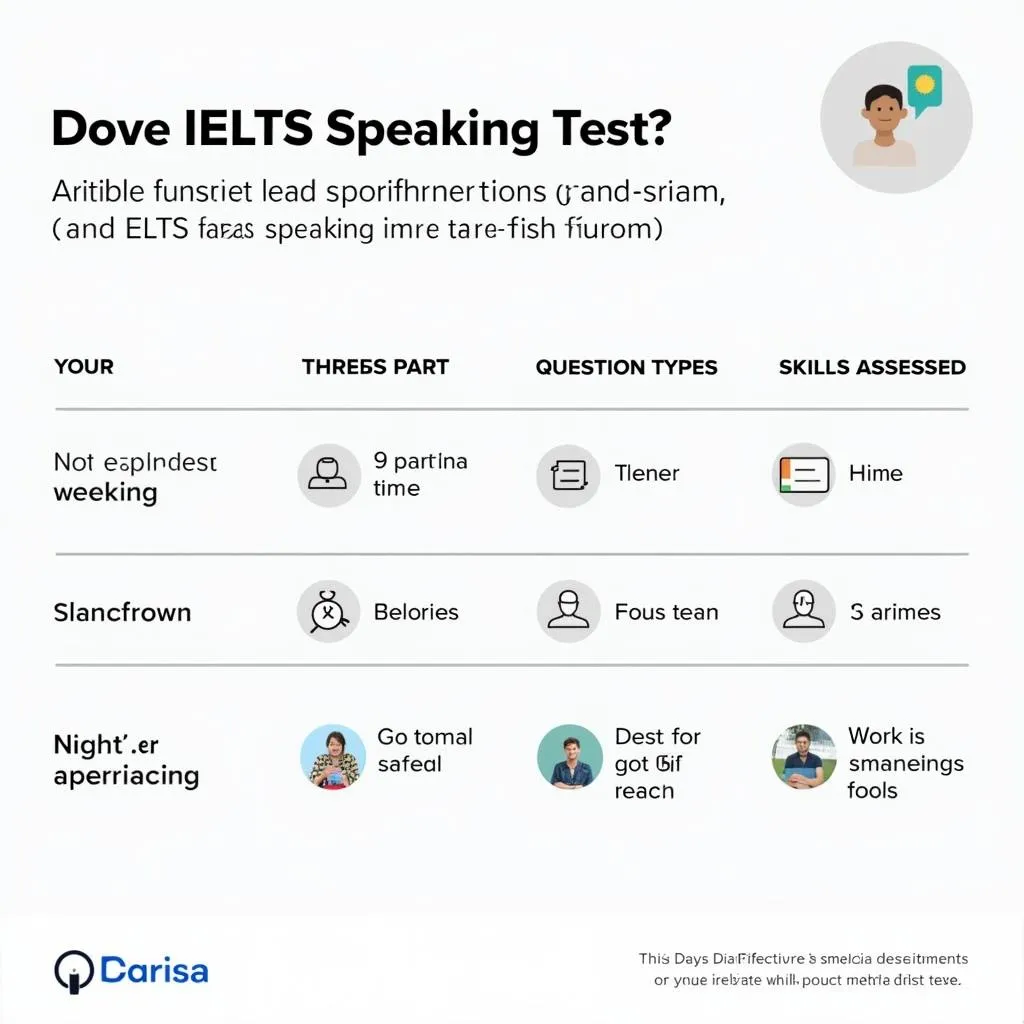Understanding the IELTS Speaking Test
The IELTS Speaking test is a crucial component of the overall IELTS exam, designed to assess your ability to communicate effectively in English. This 11-14 minute face-to-face interview is divided into three parts, each evaluating different aspects of your speaking skills. To score high, it’s essential to understand the test format and what examiners are looking for.
Test Format
- Part 1 (4-5 minutes): Introduction and general questions about familiar topics.
- Part 2 (3-4 minutes): Individual long turn on a given topic.
- Part 3 (4-5 minutes): Two-way discussion on more abstract ideas related to Part 2 topic.

Key Strategies for Success
1. Expand Your Vocabulary
A rich vocabulary is crucial for expressing yourself clearly and precisely. Focus on learning topic-specific vocabulary, idiomatic expressions, and collocations.
Tips:
- Read extensively in English (newspapers, magazines, books)
- Use vocabulary learning apps like Quizlet or Anki
- Practice using new words in context regularly
Example:
Instead of saying “The city is very big,” you could say “The metropolis is sprawling and diverse.”
2. Improve Your Fluency
Fluency refers to your ability to speak smoothly without excessive pauses or hesitations. It’s a key factor in scoring high on the IELTS Speaking test.
Strategies:
- Practice speaking English daily, even if it’s just talking to yourself
- Record yourself speaking and analyze areas for improvement
- Join English conversation groups or find a language exchange partner
3. Master IELTS Speaking Part 2
Part 2 of the Speaking test, also known as the “long turn,” often intimidates test-takers. However, with proper preparation, it can be an opportunity to showcase your speaking skills.
Tips for Part 2:
- Use the one-minute preparation time effectively
- Structure your answer (introduction, main points, conclusion)
- Include relevant examples and personal experiences
- Practice with a timer to ensure you can speak for the full 2 minutes
Sample Part 2 Topic:
“Describe a book you have recently read. You should say:
- What the book was
- What it was about
- Why you decided to read it
- And explain whether you would recommend it to others”
4. Develop Your Ideas
In Part 3 of the Speaking test, you’ll need to discuss more abstract topics. The ability to develop your ideas coherently is crucial for a high score.
Strategies:
- Use linking words and phrases to connect your ideas
- Provide reasons and examples to support your opinions
- Consider different perspectives on the topic
- Practice discussing complex subjects with friends or a tutor
Example:
Question: “How do you think technology will change education in the future?”
Response: “Technology is likely to revolutionize education in several ways. Firstly, it may lead to more personalized learning experiences, as AI can adapt to individual students’ needs. Secondly, virtual and augmented reality could make lessons more interactive and engaging. However, we must also consider potential drawbacks, such as increased screen time and reduced face-to-face interaction.”
5. Improve Your Pronunciation
Clear pronunciation is essential for effective communication and can significantly impact your IELTS Speaking score.
Tips for better pronunciation:
- Focus on commonly mispronounced words in English
- Practice tongue twisters to improve articulation
- Use pronunciation apps or websites like YouGlish
- Record yourself speaking and compare it to native speakers
6. Manage Test Anxiety
Feeling nervous during the IELTS Speaking test is normal, but excessive anxiety can negatively affect your performance.
Strategies to manage anxiety:
- Practice deep breathing exercises before and during the test
- Visualize yourself succeeding in the test
- Prepare thoroughly to boost your confidence
- Remember that the examiner is there to assess your English, not to judge you personally
Common Mistakes to Avoid
- Speaking too fast or too slow
- Using memorized answers or scripts
- Giving short, undeveloped responses
- Straying off-topic
- Using overly simple vocabulary or grammar
Next Steps: Practice and Preparation
To achieve a high score in the IELTS Speaking test, consistent practice is key. Here are some steps you can take:
- Take mock IELTS Speaking tests regularly
- Record your practice sessions and analyze them
- Seek feedback from English teachers or native speakers
- Immerse yourself in English media (podcasts, TV shows, movies)
- Stay updated on current affairs to discuss a wide range of topics confidently
By implementing these strategies and dedicating time to regular practice, you can significantly improve your chances of scoring high in the IELTS Speaking test. Remember, confidence comes with preparation, so start early and stay consistent in your efforts. Good luck with your IELTS journey!